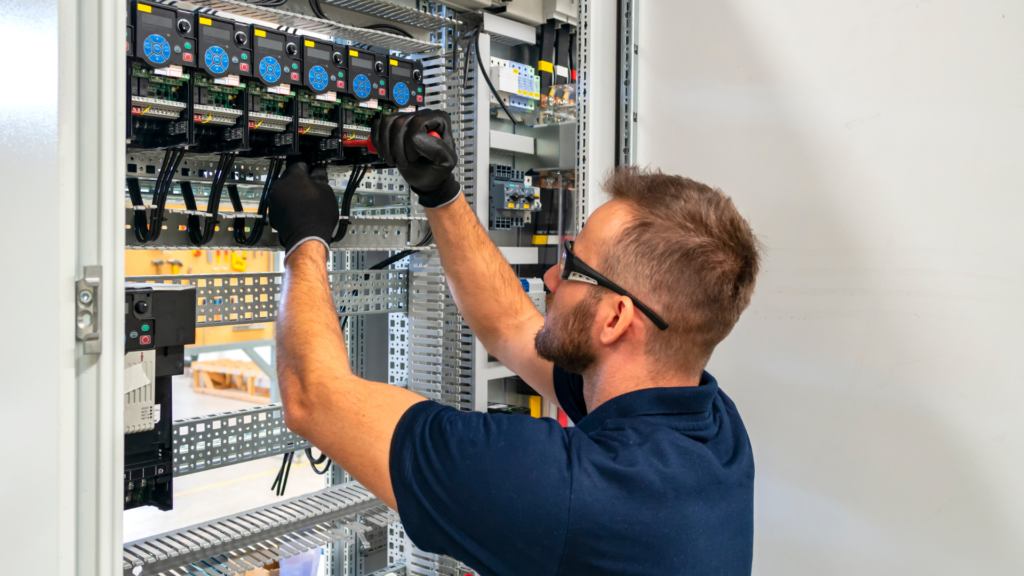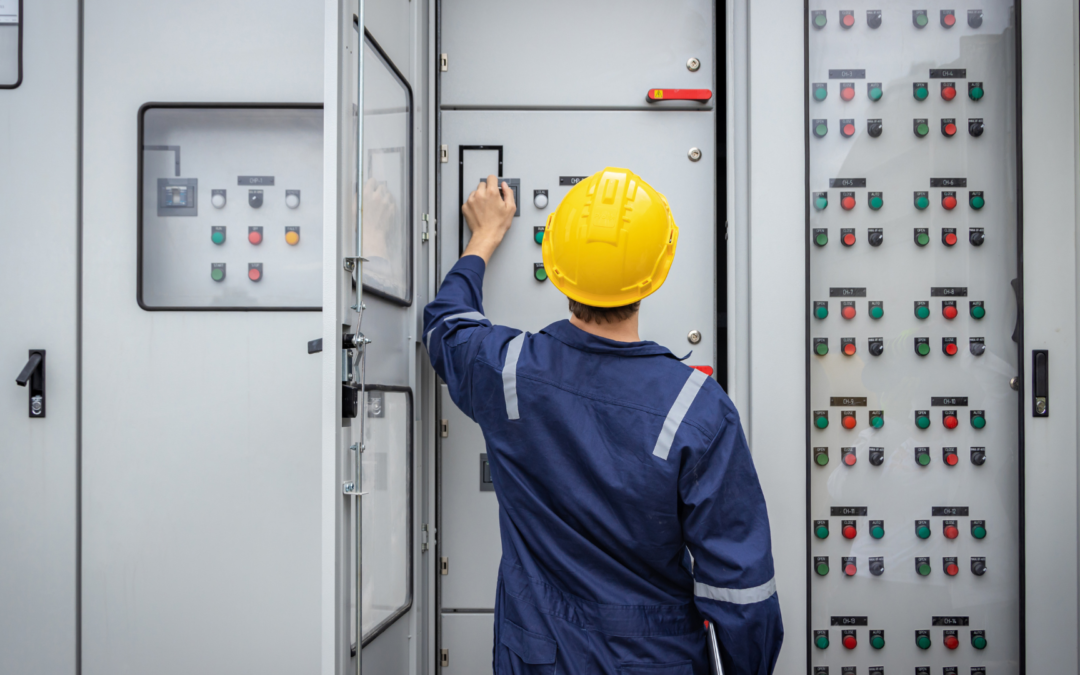Are you curious about what a Commercial Electrician does on a daily basis? Commercial electricians are responsible for installing, maintaining, and repairing electrical systems that power businesses. They work on various electrical components such as generators, wiring, and circuit breakers. This job demands specialized knowledge and skills to ensure that the electrical systems in commercial buildings are safe and functioning properly.
In this blog, we will take an in-depth look at the role of a commercial electrician, including their daily responsibilities and the special skills required for this profession. We will also dive into the training and licensing requirements for becoming a commercial electrician. Lastly, we will discuss the job environment, earnings, job outlook, and what it takes to be successful in this field.
The Role of a Commercial Electrician
Commercial electricians specialize in electrical work for commercial buildings. They install, maintain, and repair electrical components in office buildings, shopping malls, and government buildings. Their work includes handling wiring systems, electrical power, and electrical equipment. Commercial electricians ensure that all electrical work meets building codes and safety standards, playing a crucial role in keeping commercial buildings safe and operational. In their line of work, they encounter various types of electricians such as residential and industrial electricians, each with key differences in the type of electrical work they handle.
Daily Responsibilities of a Commercial Electrician
Performing electrical installations, upgrades, and repairs is a key responsibility of commercial electricians. They troubleshoot electrical systems, working with wiring, conduits, transformers, and voltages. Collaboration with other professionals, such as construction workers and engineers, is important to ensure the proper functioning and safety of electrical systems in commercial settings. Commercial electricians play a crucial role in maintaining and optimizing electrical systems in businesses and commercial buildings.
Special Skills Required by Commercial Electricians
Commercial electricians possess a comprehensive skill set that encompasses various aspects of electrical work. Their expertise lies in understanding electrical codes, regulations, and industry standards. Problem-solving is a crucial skill for them to effectively diagnose and resolve electrical issues. Additionally, commercial electricians must work efficiently, even in confined spaces, to ensure timely completion of projects. Excellent communication skills are vital for them to collaborate effectively with clients and colleagues alike. These specialized skills enable commercial electricians to excel in their field and provide reliable electrical solutions.
Training and Licensing Requirements for Commercial Electricians
To become a commercial electrician, individuals typically go through an apprenticeship program. This program combines on-the-job training with classroom instruction, ensuring a comprehensive understanding of the field. The apprenticeship programs are regulated by government agencies like the Bureau of Labor Statistics. To enroll in an apprenticeship program, a high school diploma or equivalent is generally required. After completing the apprenticeship, commercial electricians may need to pass a licensing exam, qualifying them to work independently.
Educational Background for Commercial Electricians
To become a commercial electrician, you typically need a high school diploma or equivalent to enter apprenticeship programs. Having prior coursework in math, science, and electrical systems can be beneficial. Some commercial electricians also pursue additional training through vocational schools or community colleges. It’s important for them to undergo ongoing job training to stay updated with industry advancements and electrical codes. Continuous learning helps commercial electricians enhance their skill set and improve their job prospects.
Licensing Process for Commercial Electricians
To become a licensed commercial electrician, individuals must navigate their state’s specific requirements. This often includes passing a comprehensive exam that demonstrates their competence in electrical work. Licensing regulations vary from state to state, so it’s crucial for commercial electricians to thoroughly research the regulations in their jurisdiction. Once licensed, commercial electricians must periodically renew their license, which may involve completing continuing education courses. Obtaining and maintaining a license is a testament to the expertise and professionalism of commercial electricians.

Job Environment for Commercial Electricians
Commercial electricians work in a variety of job environments, such as construction sites, office buildings, and shopping malls. Depending on the project, they may work indoors, outdoors, or in tight spaces. The job environment for commercial electricians can be physically demanding, requiring them to climb, lift heavy objects, and work in awkward positions. It is crucial for them to wear safety equipment, including gloves, goggles, and hard hats. While most commercial electricians work full-time, there are projects that may require overtime work.
Typical Workplaces for Commercial Electricians
Commercial electricians can be found working in a variety of settings. They are often employed by electrical contractors, construction companies, and building management firms. One common workplace for commercial electricians is construction sites, where they install electrical systems in new buildings. They also work in existing commercial buildings, performing maintenance, upgrades, and repairs. Some commercial electricians choose to work independently, offering their services directly to businesses. Depending on client needs, they may need to travel to different job sites.
Safety Measures in the Electrician’s Work Environment
In order to ensure their safety, commercial electricians must adhere to strict measures within their work environment. They equip themselves with personal protective equipment (PPE), such as gloves, safety glasses, and insulated tools, which help prevent electrical hazards. Additionally, they undergo training to handle potential risks like electrical shocks, fires, and equipment malfunctions. Following industry standards, building codes, and regulations is crucial for commercial electricians to ensure that electrical systems meet safety requirements. By identifying and addressing potential hazards, they promote a safe work environment.
The Earnings and Job Outlook for Commercial Electricians
Commercial electricians have the potential to earn competitive wages, with median annual incomes surpassing the national average. Earnings can vary based on factors such as experience, location, and industry demand. The job outlook for commercial electricians is promising, with a projected growth rate that surpasses the average for all occupations. Particularly in the construction industry, there are strong job prospects for commercial electricians due to the increasing demand for commercial buildings. Their expertise is crucial in meeting the electrical needs of these structures.
What Makes a Successful Commercial Electrician?
To be a successful commercial electrician, it’s crucial to stay updated with industry advancements, trends, and regulations. Strong work ethic, attention to detail, problem-solving skills, effective communication with clients and team members, and strict adherence to safety protocols are also key attributes.
Conclusion
If you are looking for a reliable commercial electrician, it’s important to understand the role they play and the skills they possess. Commercial electricians handle various responsibilities on a daily basis, ensuring the smooth functioning of electrical systems in different workplaces. They require specialized skills and knowledge to work in challenging environments while prioritizing safety measures. To become a commercial electrician, one must fulfill certain educational and licensing requirements. It is also crucial to have a strong work ethic, problem-solving abilities, and attention to detail. If you are in need of a skilled commercial electrician, feel free to get in touch with us. Our team of experts is here to assist you with all your electrical needs.


Recent Comments